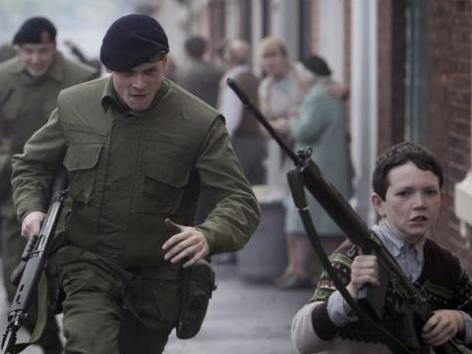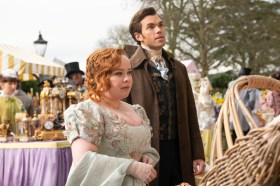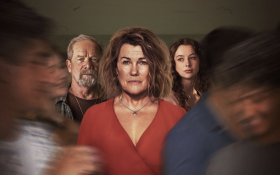Image: supplied
As lives are lost in the thick of war, each participant never knowing if their current deeds will be their last, a sense of urgency and the weight of tension are inescapable. And yet, in the many cinema visions and interpretations of conflict, immediacy and suspense are perhaps the hardest elements to capture. Carnage and surprise come bloodily and easily, but relating the unnerving buzz of clear and present danger is often relegated to telling rather than showing. Staying in the moment sees ’71 resonate with blistering primal intensity as it thrusts a terrified solider and the captivated audience into the terrors of The Troubles.
Remaining within the United Kingdom is relayed as good news to British solider Gary Hook (Jack O’Connell, Starred Up) when his squadron is deployed to Northern Ireland; it’s a placating line he himself uses upon his departure. Then he arrives in Belfast, receives a briefing that extends as far as the city’s religious and political divisions, and is sent with his fellow new recruits to conduct a house raid. The locals don’t take kindly to the military in their midst, mob rule reigning and the army retreating fast. Hook is the man left behind and caught between unsympathetic factions, everyone – whether rebellious teens defying their side’s leadership, or plain-clothes superior officers scheming away – plotting his demise to further their own cause.
Rising star O’Connell, once best known for his role on UK teen TV series Skins, soon to be seen as the lead in Angelina Jolie’s Unbroken, and featuring in 300: Rise of an Empire in between, is paramount in the film’s pervasive atmosphere of anxiety. Glimpses of his face, framed tight enough to see the fear in his eyes and the sweat on his brow, continually reinforce Hook’s mounting misery, bringing the battle down to the most intimate of levels. He says little and stares a lot; however it is not his way without words – as so menacingly seen in Starred Up – that ripples with unease, but the mounting realisation of vulnerability that seethes through every fibre of his physicality. In broad strokes, his character might personify the film’s broader awakening to the futility of war, yet O’Connell never plays the part as a symbol, even given the little known about Hook’s background.
First-time feature director Yann Demange, working with writer and fellow movie newcomer Gregory Burke, similarly transforms what could have otherwise been an ordinary and routine scenario about a relative innocent trapped in a situation teeming with complications beyond his initial comprehension. With realism, he does so with cliché-breaking aplomb and taut narrative economy in charting his everyman protagonist’s survivalist quest. Many shades of grey are evident not only in Hook’s frightened wander behind enemy lines, but also in the others submerged in the same murky circumstances. Even in the seemingly most straightforward of exchanges, both the helmer and scribe ensure that nothing – allegiances, motives, or assistance – is clear-cut or without incident.
Indeed, the reluctant intervention of a Catholic father (Richard Dormer, Good Vibrations) and daughter (Charlie Murphy, Philomena), aiding a badly injured Hook at their own peril, and the kindly bravado of a loyalist Protestant boy (debutant Corey McKinley) who offers to guide him back to the barracks, further ‘71’s presentation of the complexities of the real-life scenario. Parallels between Hook’s plight and the fortunes of Sean (Barry Keoghan, Love/Hate), a Catholic teen indoctrinated in violence but struggling with actually pulling the trigger, may rank among the most heavy-handed content, but furthers the film’s painting of its time, place and combustible climate as a waking nightmare devoid of the possibility of happy endings for anyone.
Plunging into a heated world, in microcosm, where everything is ablaze – burning shells of cars on the streets, buildings standing one moment and exploding in fire the next, tempers incessantly incendiary – Demange adopts a frenzied style to suit his frantic air. On-the-run hand-held camera work and fast-paced editing prove more than just gimmicks, aping the evident powder-keg environment and forcing viewers to experience the dizzying desperation in a brisk and brutal blur of jumpy vision, the unrelenting sound of gunfire and a rousingly percussive score. The technical mastery is confident and significant, uniformly so in a heartbreaking bombing setpiece, a terse apartment exchange, and the many cat-and-mouse runs through the catacomb-like hallways of dilapidated buildings. It is the film’s stripped-back equality of its action and emotional thrills that engages, immerses and ensures the viewer feels every insistent threat and unyielding stress, both of Northern Ireland of the period, and of the waging of wars that never allows a pause for thought or the taking of breath.
Rating: 4 stars out of 5
‘71
Director: Yann Demange
UK, 2014, 99 mins
2014 Emirates British Film Festival
http://www.britishfilmfestival.com.au/
Melbourne: 5 – 26 November
Sydney: 6 – 26 November
Adelaide: 5 – 16 November
Perth: 5 – 16 November
Canberra: 6 – 23 November
Brisbane: 6 – 16 November
Byron Bay: 6 – 16 November
Actors:
Director:
Format:
Country:
Release:





